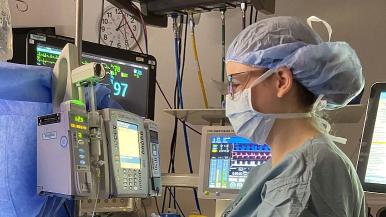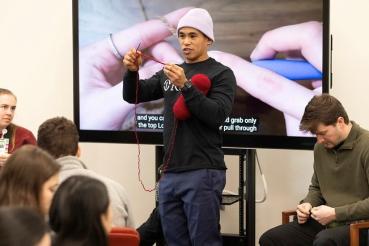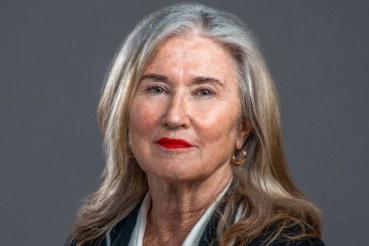Nurse anesthetists have one of the most in-demand roles in health care, with the demand for their unique skills ballooning in both rural and urban areas. In underserved communities, these providers offer high quality care at a reasonable price.
Maiko Yamashita, DNP, CRNA, director of the Nurse Anesthesia program, received new funding from the Health Resources and Services Administration to increase diversity of certified registered nurse anesthetist (CRNA) students and enhance clinical learning experiences in rural and urban areas.
Yamashita’s proposal entitled The Health and CRNA Education Equity Project has four goals:
- Financially support nurse anesthesia students in their traineeship at rural and underserved communities.
- Diversify the population of nurse anesthesia trainees, including those from disadvantaged backgrounds and underrepresented racial/ethnic minorities in the profession.
- Enhancing clinical exposure in rural and urban settings for nursing students to incorporate culturally competent care with an emphasis on social determinants of health for vulnerable and underserved populations.
- Supporting students through promotion of wellness and mentorship.
The Health and CRNA Equity Education Project will support four cohorts of nurse anesthesia students. Assistant program directors Samantha Pratt, DNP, CRNA, and Audrey Rosenblatt, PhD, CRNA, will serve as senior personnel on this project.
“This funding will ensure RUSH CRNA students graduate with the clinical skills and cultural competency they need to provide exceptional care,” says Yamashita. “It will also reinforce our commitment to mentorship and wellness, two vitally important aspects of our profession.”
Offering clinical experiences in rural and urban settings is vital to both patient care and for communities as they seek to recruit highly skilled providers. CRNAs offer cost effective anesthesia care in settings with limited resources. They provide over 50 million anesthetics per year in the United States and account for 80% of anesthesia providers in rural and underserved communities, according to the American Association of Nurse Anesthesiology.
“The literature is clear — increasing exposure to employment opportunities in rural and urban underserved communities will increase the likelihood that they will seek employment in these settings,” says Yamashita. “We’ve seen this among our own alumni. More than 50 percent of students who had clinical experiences at diverse clinical sites accepted jobs at sites where they trained.”
In 2022, Yamashita codified the strategic plan for the CRNA program that includes 4 pillar priorities—Preparation for Current Practice, Diversity Equity and Inclusion, Wellness, and Professional Development.
The RUSH CRNA program has increased the diversity of the student population through the implementation of a holistic admissions process and requirement of formal implicit bias training for all faculty participating in the admissions process. Since 2021, there has been a 66% increase in underrepresented minority students matriculating into the program.
To prepare students to provide culturally competent care, students receive clinical and didactic education that includes content on diversity equity and inclusion, the impacts of social determinants of health, and the care of patients with lack of access to health care. Students also receive innovative education in the simulation lab with standardized patients that reflect the diverse patient population served. Such education has provided students to practice culturally competent communication skills, receive immediate feedback from standardized patients, and opportunities for self-reflection to then implement into the clinical setting.
RUSH also recognizes the importance of student wellness throughout the rigorous educational experiences CRNA students have. To address this, RUSH created a Wellness Committee specifically for students, incorporated a weekly wellness day off during training, and established a three-year-long peer mentorship program, with plans to also add a formal mentorship program for BIPOC trainees.
“The future CRNA workforce should reflect the diverse population that we serve, and the learning environment must be one that is supportive of all learners. Wellness and mentorship are important factors for our student’s health, educational success, and the safety of patients,” Yamashita says.
Christine Kennedy, PhD, RN, FAAN, John L. and Helen Kellogg Dean of RUSH College of Nursing and Interim Provost, RUSH University, believes that the new funding from the HRSA will benefit not only CRNA students, but patients and their communities, as well.
“Educational equity is an essential aspect of our nursing education,” Kennedy says. “Dr. Yamashita’s new funding helps us actualize our mission and vision and opens doors for students, patients and communities.”




